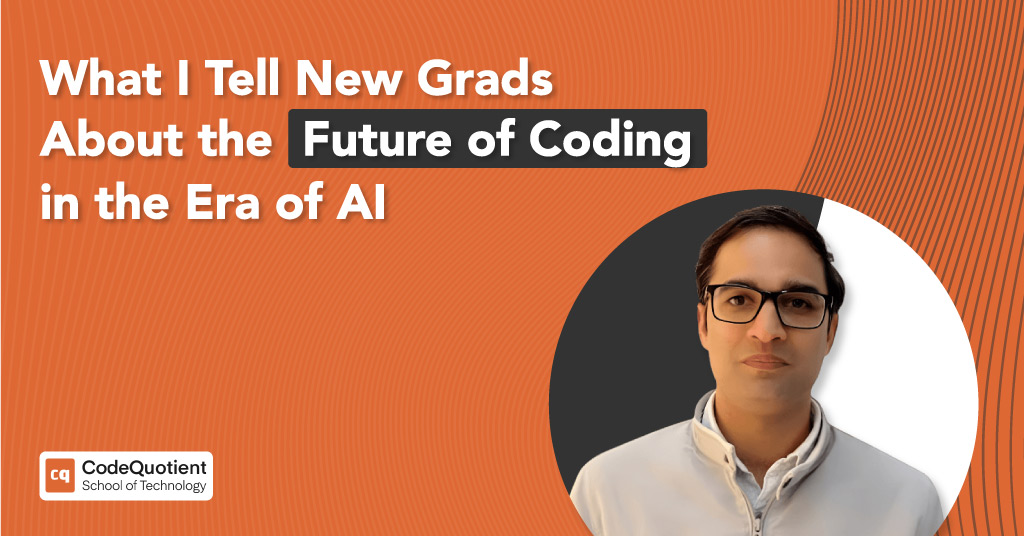In 2024, artificial intelligence will become not just an assistant but a catalyst for innovation. And with that, the question of its role in coding careers becomes increasingly pertinent.
A recent study predicts that AI could automate up to 30% of software development tasks by 2030.
So, The journey ahead is not about competition with AI but learning to harness its capabilities to enhance our own.
This also underscores the transformative potential of this technology in the coding profession. As I’ve witnessed firsthand the seismic shifts AI is bringing to our industry, let me elaborate on how new graduates can not only navigate but thrive in an AI-augmented coding landscape.
The Reality of AI in Coding
The question, “Will AI replace coders?” lands in my inbox more often than any other.
The reality is that AI in coding is here, and it’s not a harbinger of obsolescence for human coders. However, it sets the stage for a lot of progress.
AI tools are becoming integral to our workflows, serving not to replace us but to amplify our capabilities. They’re here to take over the mundane, repetitive tasks that can bog down the creative process, thereby freeing us up for higher-order problem-solving and innovation.
At this point, understanding the capabilities and limitations of AI is crucial. It’s a tool, a powerful one, but it lacks the nuanced understanding and creative problem-solving abilities that come naturally to humans.
In essence, AI in coding is less about replacement and more about augmentation.
It’s about how well coders can leverage these tools to enhance their productivity and creativity. The focus, especially for new grads entering the field, should be on mastering how to make AI work for you, not fearing it will work against you.
The Edge of Skilled Coders Over AI
In the dialogue around AI’s role in coding, I consistently champion the irreplaceable value of skilled coders. The edge we hold over AI is not just in our ability to write code but in the creativity and problem-solving prowess we bring to the table.
AI can process and execute tasks with remarkable efficiency, yet it falls short in areas requiring deep coding knowledge, understanding of complex algorithms, and, most importantly, the ability to innovate.
The human aspect of coding—our intuition, our capacity to understand user needs, and our ability to innovate—is what sets us apart. Here, fostering deep technical knowledge and a problem-solving mindset is paramount. These qualities ensure coders remain indispensable and capable of driving innovation in ways AI cannot, at least not right now.
Adapting to the AI-augmented workplace
Adapting to an AI-assisted workplace is all about reshaping your approach to coding and problem-solving in a way that leverages AI to your advantage. Here’s my advice for new grads:
1. Master AI Literacy
Understand the principles behind AI and machine learning. This isn’t just about using tools; it’s about knowing why and how they make decisions. This knowledge enables you to craft better prompts, debug AI-generated code effectively, and innovate at the intersection of traditional coding and AI.
2. Cultivate an AI Partnership Mindset
View AI as a junior developer on your team. This means learning how to delegate tasks to AI that it can perform well, such as code generation, testing, or even finding bugs, while you focus on higher-level architecture and problem-solving that require human insight.
3. Sharpen Your Problem-Solving Skills
In an AI-driven world, the ability to solve complex problems creatively becomes even more crucial. Work on projects that challenge you, delve into algorithms, and always ask, “How can this be improved?”
4. AI doesn’t have the Soft Skills that Humans Do
Communication, empathy, and teamwork are irreplaceable. AI can write code, but it can’t interact with clients, understand their needs deeply, or work in a dynamic team environment where human emotions and motivations play a crucial role.
5. Learn to Prompt Effectively
Prompting AI effectively is an art and a science. It requires understanding the capabilities of AI, the context of your problem, and how to communicate your needs succinctly. This skill will become as fundamental as coding itself.
AI & Human Skills: Thriving through the Synergy
The key takeaway is clear: the future of coding is a symbiotic relationship between human creativity and AI’s computational power. This partnership promises to elevate our capabilities, streamline processes, and unlock new horizons of innovation.
To the new grads, I say: Embrace this change with open arms and a curious mind. The path ahead is ripe with opportunities for those prepared to leverage AI as a tool for enhancement, not a competitor. Equip yourself with the knowledge, skills, and mindset to thrive in this exciting future.
For those looking to deepen their understanding and skillset, CodeQuotient School of Thoughts offers a range of courses designed to prepare you for an AI-integrated coding environment.
Together, let’s step confidently into this promising future.




